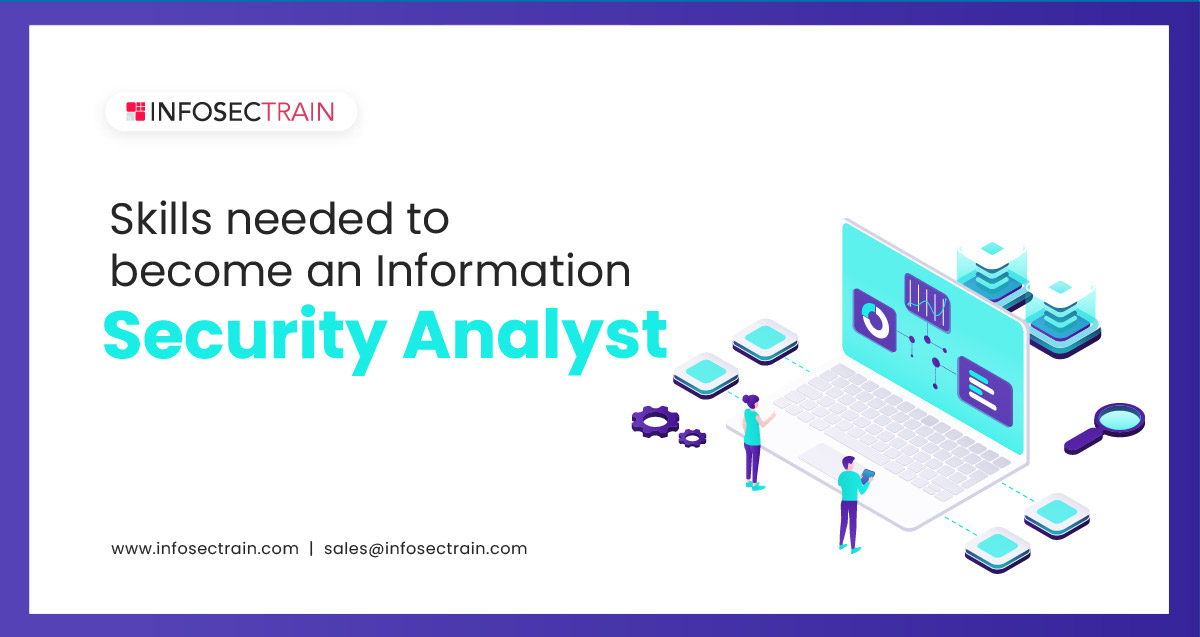Skills Needed to Become an Information Security Analyst
Technology is constantly evolving and making job roles more challenging and fascinating in Information Technology and Security. As technology enhances, information security threats also increase with the latest techniques and tactics, making the role of Information Security Analysts more essential to organizations in safeguarding information.

Information Security Analysts play a crucial role in protecting the organization’s data from unauthorized access by ensuring its confidentiality, integrity, and availability. This comprehensive blog is curated with a list of skills that an Information Security Analyst must possess.
Table of Contents
What is an Information Security Analyst?
Information Security Analyst Skills
Network Infrastructure
Security Management Frameworks
Operating Systems Vulnerabilities
Data Privacy and Regulations
Information Technology Knowledge
Problem-Solving Skills
Technical Writing Skills
Certifications for an Information Security Analyst
What is an Information Security Analyst?
An Information Security Analyst is a professional responsible for protecting an organization’s information, computer systems, and networks from security threats by implementing security protocols. They execute analytical skills to identify vulnerabilities in security systems and ensure that confidential data is secured.
Information Security Analyst Skills
Information Security Analysts should possess a combination of both strong Information technology and security skills. The following are the necessary skills to become an Information Security Analyst.
1. Analytical
Information Security Analysts should have proficient analytical skills to collect and analyze information and make prominent decisions in the organization. They are also accustomed to assessing potential risks, developing possible solutions, and improving the organization’s productivity.
2. Network Infrastructure
Information Security Analysts should have strong networking skills and a good understanding of various types of networks used in organizations. They should possess good knowledge of firewalls, routers, and other security infrastructure.
3. Security Management Frameworks
Information Security Analysts should possess good knowledge of setting up the security posture for the organization. They are responsible for implementing security frameworks such as NIST, ISO, HIPAA, etc., for mitigating cyber threats. They should have strong security framework skills to effectively identify, protect, and respond to cyber threats.
4. Operating Systems Vulnerabilities
Information Security Analysts should have working experience with the most common operating systems, such as iOS, Microsoft Windows, and Linux. Vulnerabilities are identified within the operating system, allowing hackers to exploit them, resulting in a DoS attack. Good operating system skills help to update and patch the software security gaps to mitigate cyber-attacks.
5. Data Privacy and Regulations
Data Privacy skills are in high demand and becoming a crucial part of security and compliance for businesses. Information Security Analysts should possess strong knowledge of data privacy and the regulations on various privacy regulations such as GDPR, CCPA, and GRC.
6. Information Technology Knowledge
Information Security Analysts should have knowledge of Information Technology as it is a constantly evolving domain. It is required to regularly update skill sets with the latest IT trends and cybersecurity techniques.
7. Problem-Solving Skills
Information Security Analysts should constantly have an open eye for potential security issues and exploits in the system. Critical thinking and problem-solving skills are required to determine the issue, develop the solution, and resolve the issue that helps organizations to reduce the impact of security incidents.
8. Communication Skills
Good communication skills are essential for every profession in the cybersecurity and information security domain. Information Security Analysts must work with a large group of people irrespective of the department, and they should communicate the best practices required to mitigate cyber threats.
9. Attention to detail
Information Security Analysts are responsible for monitoring networks to identify and respond to security threats. Strong attention to details of the security incident helps to organize and prioritize the security threats in place.
10. Working under pressure
Information Security Analysts should respond to security threats as early as possible to reduce the impact of the security incident in the organization. At times, they need to work under pressure to protect the information from unauthorized access.
11. Technical Writing Skills
Information Security Analysts should possess good writing skills as they are responsible for drafting security guidelines and generating reports on security incidents on a regular basis.
Certifications for an Information Security Analyst
A certified information security designation includes various certifications that help develop the required security skills and abilities to maintain an organization’s security posture. The following are certifications for Information Security Analysts:
- CySA+ accredited by CompTIA.
- CompTIA Security+ accredited by CompTIA.
- Certified Information Systems Security Professional (CISSP) accredited by (ISC)².
- Certified Ethical Hacker (CEH) accredited by EC-Council.
Information Security Analyst with InfosecTrain
The Information Security Analyst role has a great demand in IT, and many job openings are available. Technical security experts help provide appropriate training and skills to protect an organization’s information from hackers.
InfosecTrain is a leading global provider of training and consultancy services in Information security and cybersecurity domains. It offers an Information Security Analyst training and certification program that helps to achieve the necessary skills required to protect and maintain information security by preventing security threats. To get certified as an Information Security Analyst, enroll now.






 1800-843-7890 (India)
1800-843-7890 (India) 
